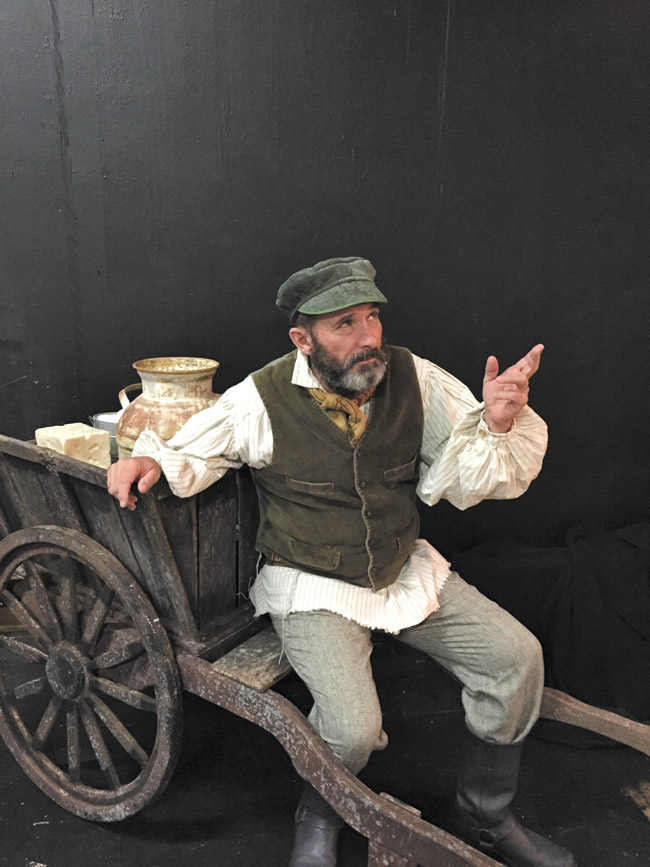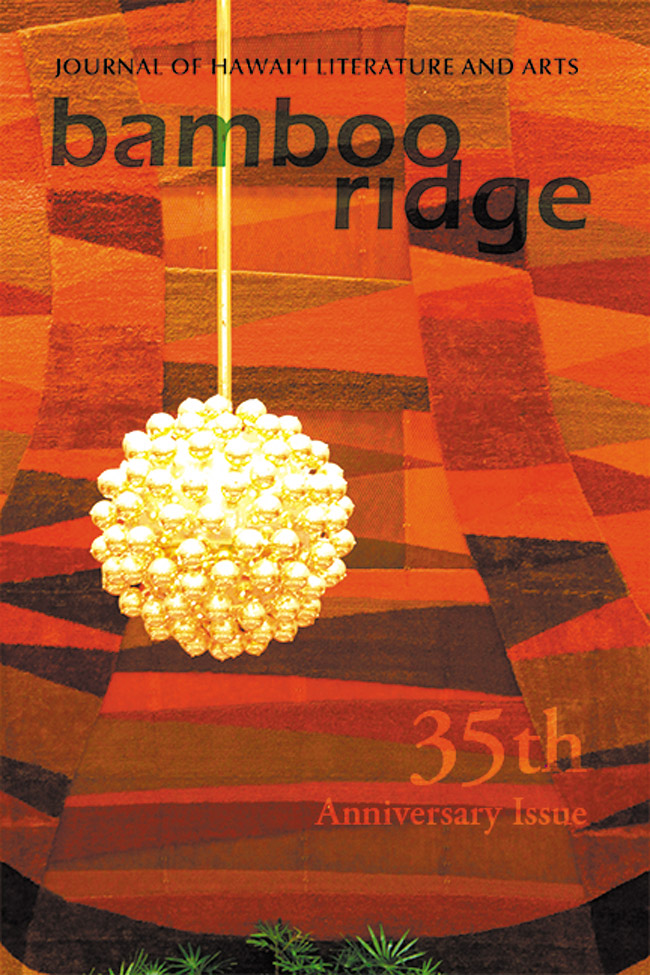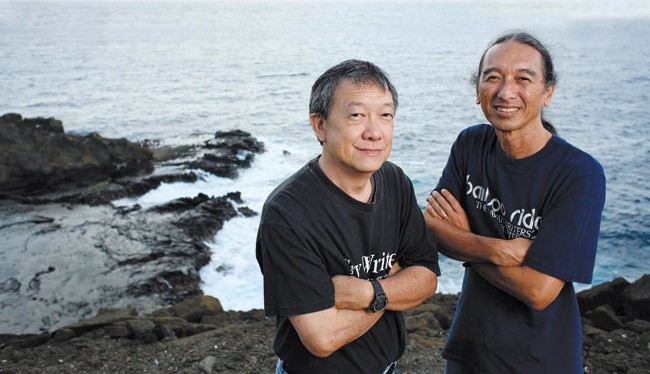At Home in Anatevka

Eli Foster as classic Broadway’s most relishable optimist, Tevye, in ‘Fiddler on the Roof’. Photo courtesy of Paul and Vi Loo Theatre
There’s a countrified timelessness in wooden shelves and banisters, draped rope, yellow-glow lamps, wooden furnishings and metal dishes. Something warm that in humanity’s ancestral spirit feels like home. That being the case, walking into HPU’s Paul and Vi Loo Theatre to see Fiddler on the Roof is to be steeped in coziness from floor to ceiling. Add the strum of violin strings and the jovial Eastern European atmosphere of a bellowing accordion, and about 30 villagers in quaint skirts and scarves, pants, vests and hats … and welcome to the charming little town of Anatevka. A town where despite gossip and old gripes, poverty and the threat of pogroms, a sense of humor and salt-of-the-earth simplicity keeps the town in balance … well, as balanced as a “fiddler on the roof,” that is!
Hats off to director Joyce Maltby for making a full-scale musical work in such an intimate setting, and to choreographer Brad Powell for getting all the bodies to move just so. We’re talking dance number after dance number with dozens of bodies moving all at once on a tiny stage. Speaking of feats of accomplishment, the dancers also pull off a Russian routine with real bottles.
Eli K. M. Foster as Tevye barely gets a break from the stage, luckily for us. A sense of hardy-faced optimism might not flow from him as easily as from the film’s treasured Chaim Topol, but Foster is Tevye. He immerses himself in his characters so completely that he’s nearly unrecognizable from role to role. If you haven’t marked him out as the police detective in Glengarry Glen Ross or force of nature Thaddeus Stevens in Resistance, both earlier this year at TAG, his turn as Tevye is a marvelously bold “Here I am” that you won’t soon forget.
The production is blessed with a perfectly sincere and gangly Motel the Tailor in Joshua C. K. Aiu. His klutzy attempt at asking for Tzeitel’s hand segues into Sabbath Prayer, a humming, heart-stirring number that encapsulates the family’s foundational essence. Its sacred hum fills the air with a sense of comfort and well-being. Despite a crippled horse and five daughters to feed and find husbands for, through tradition the family remains cohesive, happily making do with very little.
Ann Brandman isn’t a very matronly Golde, but she does her part as a little thorn in Tevye’s side, and shows she has a soft side too in Do You Love Me? The three young couples (Tevye’s and Golde’s oldest daughters and their beaus) bring a visceral feel to their budding romances, as do the parents in their angst at unsuccessfully trying to shelter and guide their wayward progeny.
The play’s assortment of characters include all the memorable roles in the film, from the Rabbi to Grandma Tzeitel, Fruma-Sarah, the innkeeper, Yente, Lazar Wolf, a constable and plenty of villagers. The Rumor, like a game of telephone, strikes up one of the funnier scenes in the show, and has these various characters piping in with the latest gossip that gets fully out of control. In the overall production, some of the singers are stronger than others, but all of the major songs are delivered by capable voices.
September marked the golden anniversary (50 years) of Fiddler‘s Broadway debut, and HPU’s tucked-away little theater does justice to the stalwart classic. Prepare to head home to the echo of Tradition, If I Were a Rich Man and the more somber “Anatevka, Anatevka …”
the TICKET stub
FIDDLER ON THE ROOF
When: Through Nov. 30
Where: Paul and Vi Loo Theatre
Cost: $5-$20
More Info: 375-1282, hpu.edu/theatre
ALSO SHOWING
Passing the ‘Bamboo Ridge’ Torch
 Chances are, if you’ve been in Hawaii since 1978, you’ve thumbed through the pages of Bamboo Ridge, where you’ve been introduced to and seduced by your first reading of prose and poetry in Pidgin, and reveled in the anomalous comfort of it. Brain and heart inked across the pages talking distinctly about life in Hawaii ― the way it really is, not the exotic tourist brochure version — with creative renditions of every range of imaginable experiences growing up Japanese or Chinese, Korean or Filipino, Hawaiian or haole or any mix therein in this remote U.S. archipelago.
Chances are, if you’ve been in Hawaii since 1978, you’ve thumbed through the pages of Bamboo Ridge, where you’ve been introduced to and seduced by your first reading of prose and poetry in Pidgin, and reveled in the anomalous comfort of it. Brain and heart inked across the pages talking distinctly about life in Hawaii ― the way it really is, not the exotic tourist brochure version — with creative renditions of every range of imaginable experiences growing up Japanese or Chinese, Korean or Filipino, Hawaiian or haole or any mix therein in this remote U.S. archipelago.
Their brainchild was a bold, rebellious slice of literature in a format that traditionalists might balk at, at least those few decades ago when founders Eric Chock and Darrell Lum first stapled together their revolutionary booklet for the curious and enlightened to consume for just $1.25. Thirty-five years and many local and national book awards later, the poetic duo are passing the torch, with issue No. 104, featuring guest editors Lee Cataluna and Lisa Kanae. Works by all four editors, who also happen to be illustrious local authors, are featured along with nearly 40 veteran and new contributors to this transitional edition of Bamboo Ridge.
Five launch celebrations with readings by the various authors will take place the week of Nov. 16, with the premiere launch, From Roots to Shoots a Wine & Words Fundraiser, happening 7 p.m. Nov. 18 at Manoa Valley Theatre (bambooridge.com). This promises to be quite an eventful gathering — honoring the past, present and future of the publication — with Chock, Lum, Kanae, Editors’ Choice Award winners and a few BR favorites all in attendance.
No. 104 opens with works by the three award winners: Christy Passion’s poems and Kevin Won’s prose delivering a one-two punch, and Connie Pan’s Best New to Bamboo Ridge poem, Black Sleep, delivering the knockout. If, as the saying of arguable origin goes, “Art should comfort the disturbed and disturb the comfortable,” these three authors take the title arena of 270 pages of literary works that fit snugly into that category, followed by an equally rousing letter of aloha from Lum.






